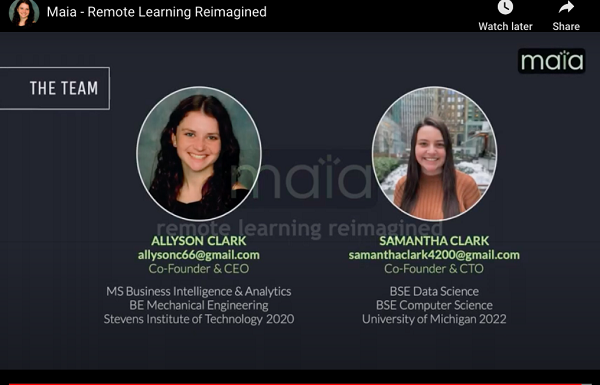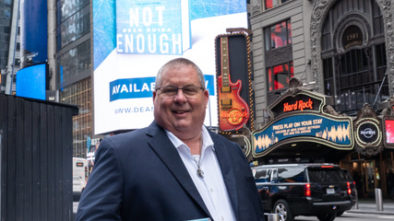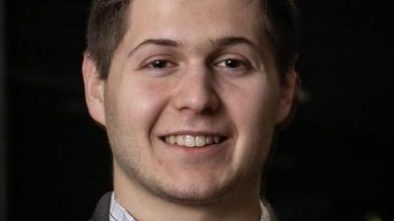At Stevens Virtual HealthHack, Teams Focus on Innovation in the Time of COVID-19
The Stevens Venture Center, Stevens Institute of Technology’s startup incubator, held a virtual hackathon in two parts, the first in April and the second in May, to focus on innovation in the time of COVID-19.
The first-place winners, selected by a panel of industry experts, include Maia, a web application that reinvents remote learning through live animation, and Discover, a wearable patient-monitoring system that enables nurses to quickly assess patients’ vital signs at a safe distance and diagnose symptoms of disease.
COVID HealthHack I addressed “several pandemic-related issues including drug discovery, modular hospital units, and PPE supply-chain tracking tools,” according to an article in Inc. The article continued, “Hack I had global participation ranging from students to industry professionals across science, medicine, engineering, and business. … One of the winning teams was FitMask Crusaders, which designed a custom-made mask frame that conforms to the contours of the individual wearer’s face and creates a tight, but comfortable, seal–improving wearability and efficacy.”
COVID HealthHack II drew over 500 participants during the 10-day event in May, with more than 100 teams of students, researchers and business professionals working together to develop solutions along a number of different tracks, including virtual experiences, crowd monitoring, telemedicine and symptom tracking. The competition, which awarded a total of $5,000 in prize money, included both new teams and those who had participated in HealthHack I.
New Jersey tech company Infragistics (Cranbury), as part of its Ignite for Good program, promoted the event, sharing it with the company’s developer community and networks. Infragistics has also helped the teams, conducting virtual workshops and providing the participants with access to its full line of UX/UI and analytics tools, including Ignite UI, Indigo.Design and Reveal.
The April and May events were judged by Raul Perez-Olle, VP of medical affairs at MacroGenics (Rockville, Md.); Scott Omelianuk, editor-in-chief of Inc. Magazine; Silvia Garcia Codony, CEO of Mira Therapeutics (Hoboken); Adrienne Choma, a former life sciences executive and former director of the Stevens Venture Center; and Leigh Ann Soltysiak, a commercialization strategy consultant at Silverleaf Consulting (Summit). An additional judge, David Zimmerman, director of technology commercialization at Stevens Institute of Technology, joined the group for HealthHack II.
“Stevens’ COVID Health Hackathon was organized to create an environment for students, academics and industry experts to collaborate, discover and help overcome the challenges presented by the pandemic as the world begins to reopen,” said Premal Kamdar, Stevens entrepreneur-in-residence and creator of the COVID HealthHack, along with Stevens students Justin Trugman ’20, Hayden Daly ’21, Frank Pinnola ’22 and Maor Mashiach ’23.
The virtual event drew participants from around the U.S. and around the world, many from leading academic institutions and organizations such as Columbia University, Harvard, MIT, Stevens Institute of Technology, Stanford, Facebook, Verizon, Mount Sinai Hospital and Siemens AG.
The Winners of HealthHack II
Maia (New Projects): Created by sisters Allyson and Samantha Clark, and inspired by their mother, a high school teacher who has been struggling to keep her students engaged while delivering lessons online, Maia is a web application that uses facial-tracking and motion-capture tools to create animated avatars representing both teachers and students. Teachers can write on a virtual whiteboard; add sound effects, stickers, and videos to their lessons; and easily start polls, assignments, and games. Students can click on their character to raise their hand at any time and write on the interactive board when called on. Currently designed for elementary school classes, it has the potential to be used for all educational levels.
Discover (Existing Projects): The Discover team began their project at the April HealthHack and completed it during HealthHack II. Discover is a wearable patient-monitoring system that minimizes physical contact between nurses and patients, thus reducing the amount of personal protective equipment needed. Using the device, a single nurse can monitor up to 100 patients in the time it usually takes to check the vital signs of one patient. The data are immediately transferred to a dashboard, from which doctors and nurses can oversee many patients at once; and an automatic alert system instantly identifies deteriorating symptoms, so they can be immediately responded to.
The Runners Up
Interspace (New Projects): Interspace is a social distancing application that leverages social media location data to determine the population density in a given area, so people can make informed choices about whether it’s safe to go to that location.
Sesame (New Projects): This is a mobile application that allows customers to reserve a time slot for entry into retail stores, in exchange for rewards. Automatic people counting, density tracking and QR Code features eliminate the need for retailers to employ door attendants, while reserved time slots do away with long lines for customers.
ClearFit Mask (Existing Projects): The ClearFit Mask is a 3D-printed reusable clear mask that is custom made for each user to ensure a proper fit for comfort and protection. The mask also improves communication by showing people’s facial expressions.
Hopeful Home (Existing Projects): The Hopeful Home app aids and supports victims of domestic abuse by allowing users to safely log their feelings and experiences while empowering them with information on their legal rights, protective actions and resources.




